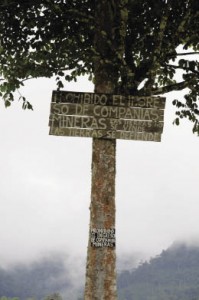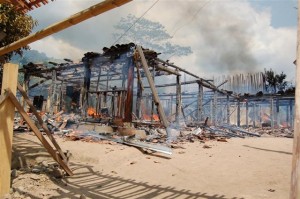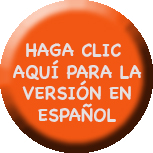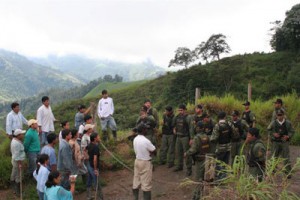The present threat of CODELCO and ENAMI marks the third phase of mining conflict in Intag.
In the early 1990s a Japanese corporation, Bishimetals began to explore for minerals in the region. Communities were not informed about the project, and the company began explorations without legal permits. The company’s mining camp was found to discharge its bathroom waste directly into the Junin river, a source of water for residents downstream. Opposition to Bushimetal’s presence rose.

Sign rejecting mining on a tree on the ridge near the community of Cerro Pelado, Intag. “Prohibido el ingresso de companias mineras. Las tierras no se vende. Las tierras se defiende.”
The company’s activity prompted Intag residents to educate themselves about the effects of open pit copper mining. They began to organize in resistance, and in 1995 grassroots organization DECOIN, or Defensa y Conservacion Ecologica de Intag was founded. Today DECOIN continues to work toward the objective of resisting mining, conserving biodiversity and promoting sustainable alternatives for development. Other organizations such as the coffee coop Asociacion Agroartesanal de Caficultores Rio Intag,created by DECOIN in 1998, grows and sells shade grown coffee nationally and overseas, and was also formed as a direct result of the mining threat. In 1996 Bushimetal’s submitted an Environmental Impact Assessment that assessed the impacts of exploiting a relatively small copper deposit in Intag. By law, companies are required to conduct this study for any project that poses a high risk to the environment. The EIA predicted massive deforestation, impacts to endangered species, the relocation of 4 communities and contamination of water sources (see the complete summary at:.
Even Bushimetal’s initial explorations had negative environmental impacts. The company drilled deep into the ground to collect rock samples and identify the quantity and quality of the mineral deposit. A study published in 2012 revealed that 15 years later these drill holes continue to leak arsenic into the Junin river. The study warns that water from the river should not be consumed or used for cooking.
DECOIN lodged repeated complaints and concerns with the Ministry of Energy and Mines about Bushimetal’s activities in Intag, but no action was taken. The conflict came to a head in May 1997 when hundreds of protestors from seven communities occupied Bushimental’s camp. After three days, frustrated that their demands were being ignored, they dismantled part of the camp and burnt what remained.Realizing the extent of opposition Bushimetal’s withdrew from Intag.
In September 1997, in the second assembly for county unity, Cotacachi was voted an Ecological County ‘with the objective of protecting our environment and to avoid economically destructive activities, such as… mining.’ This demonstrates ‘the degree of rejection felt by the citizens against mining’ wrote the mayor of Cotocachi in a letter addressed to Ascendant Copper, the second corporation to move into Intag.
As if this counted for nothing, in 2004 the Canadian company Ascendant Copper (later known as Copper Mesa) was granted full concession to the mining site in Intag. Their activities followed a similar pattern to Bishimetal’s. Like Bishimetals they did not consult the local communities. Again conflict flared in Intag. But this time the opposition was determined not to allow the mining to proceed, and the communities stopped the company from even exploring. In 2008 the company’s concessions were cancelled due to fierce and organized resistance. To date, the only exploratory activities in Intag have been that of Bishimetals during 1993-1995, which had to be abandoned due to the community resistance. No company has been able to finish the exploration, much less begin exploitation.

After 18months of death threats, lawsuits, aggravated assaults and divided communities Ascendant Copper’s camp is burnt down by frustrated locals opposed to mining.
To gain support for their project Ascendant Copper launched an organization called CODEGAM. CODEGAM employed people from Intag and was supposedly in charge of community development, of road building, housing and hospital projects in the area. In practice, CODEGAM engaged in an aggressive pro-mining campaign. There were allegations of bribery and intimidation. CODEGAM followers blocked roads so that anti-mining activists could not meet. In their assemblies they publicly denounced the mayor for his anti-mining stance and called for the creation of a new municipality. The organization was fully funded by Ascendant Copper.
Social rifts in Intag deepened. Anti-mining activists received death threats and were arrested on false charges. There were smear campaigns against DECOIN members and lawsuits were filed. Human rights groups such as Ecuador’s CEDHU, and Amnesty International became involved.
Despite conflict and intimidation opposition to mining ran strong. In December 2005 protests led to the burning down of Ascendant’s mining camp. Three hundred inhabitants from 15 communities assumed collective responsibility for the act. In the Intag regional assembly in May 2006 nearly 800 people including parish presidents, community representatives and residents voted for firm anti-mining measures and to expel Ascendant from Intag. In July 2006 600 residents marched to the Ministry of Energy and Mines and Ascendant’s offices in Quito to protest mining in the region.
In November and December 2006 armed guards tried to gain entry to ascendant’s concessions. They were blocked by communities, resulting in violent confrontations. These armed guards were labelled paramilitaries by Quito based human rights group CEDHU.
In late 2007 after three years of conflict, divided communities and social unrest the minister of Petroleum and Mines ordered Ascendant Copper to suspend all activities.
In 2007 a socialist government under Rafael Correa took charge. The administration adopted a new constitution that used indigenous concepts, granting rights to nature and the right to a good life, or ‘buen vivir.’ In a seemingly hypocritical turn Correa now fully backs the extractive industry, insisting that Ecuador needs the royalties.
Following the March for Life to Quito in early 2012 to protest an open pit copper-gold mine in the Amazon in Shuar ancestral territory, hundreds of indigenous protesters face inflated charges of terrorism. Correa has proposed that Ecuador, together with Peru and Columbia, address the ‘problem’ of anti-mining activists. In another example of hypocrisy, the national oil company, Petroamazonas, backed by public security forces, is set to begin prospecting in the Amazon against the wishes of local communities.
Ecuador created it’s own national mining company ENAMI (Empresa National Minera) in 2009. On July 26th 2012 the Chilean and Ecuadorean governments signed an agreement to (re)activate the Junin copper project in Intag. Chilean copper corporation CODELCO and ENAMI are set to begin explorations during the second quarter of 2013. The government has not consulted with the communities or local governments regarding this possible scenario, which would be in clear violation of the country’s Constitution.
On 20th August 2012 ENAMI employees arrived in Junin. As they have done for 18 years, the community unanimously rejected their presence. Click here for footage.

Disregarding 18 years of community opposition, the presidents of Chile and Ecuador sign a deal to reopen Intag to mining. Intag prepares for yet another conflict.
- Mining conflicts around the world
http://www.ejolt.org/2012/11/mining-conflicts-around-the-world-common-grounds-from-an-environmental-justice-perspective/ - An ecological study of Ecuador’s Intag region
http://www.eartheconomics.org/FileLibrary/file/Reports/Final%20Intag%20Report_lo_res.pdf - Brief history of mining resistance in Intag http://www.decoin.org/breve-historia -de-la-resistencia-a-la-mineria/
- Centro Documentazione Conflitti Ambientali http://www.cdca.it/spip.php?article1665&lang=it
- http://cordinadorazonalintag.blogspot.co.uk/p/intag.html
- The curse of copper documentary film
http://vimeo.com/69452

